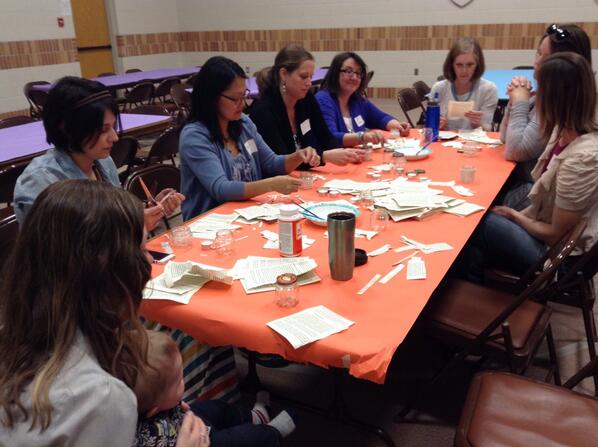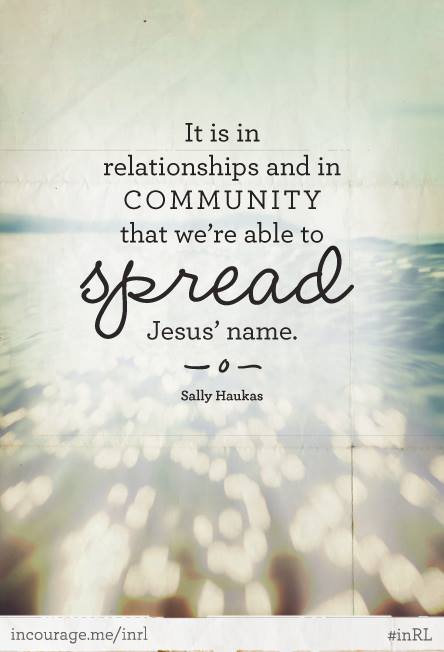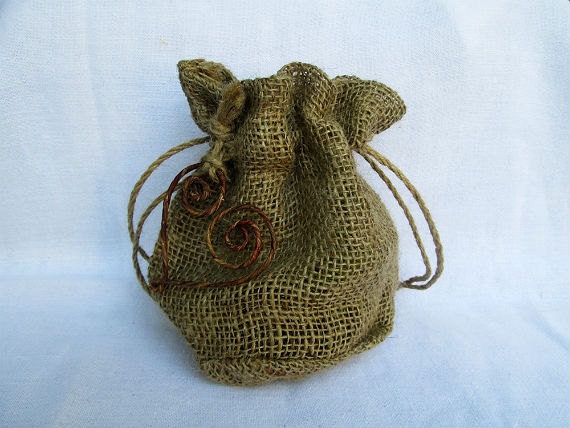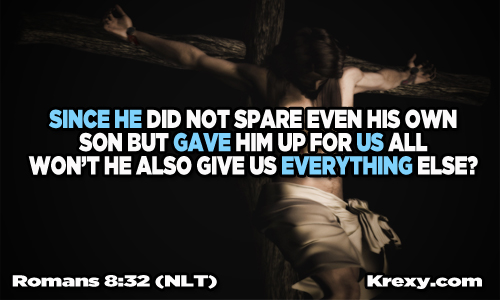
So we’ve moved to Tucson, Arizona in the last six months, and obviously a lot has changed! We have a new house, a new climate, I have a new job, and we are going to a new church. Still the same denomination, but a much more grace-based pastor and church family than I’ve experienced, certainly in the last nine years in Minnesota, and probably in my life (although I wasn’t always listening, so I can’t be sure –shh!).
I’m home from church today with the flu, and I was listening to some of the pastor’s past sermons. This fall he was preaching a series on the pillars of the church, and I missed a few, so I thought this would be a good time to catch up. Did I mention this is a MUCH more grace-based church? I (unfortunately) have tended to lean toward the legalistic side, which stresses me out and makes me feel horrible, and I may have to go back and take a look at a few of my past posts in light of what I’ve been learning and realizing over these last six months.
Today I got to thinking about grace-based salvation versus All The Other Varieties out there. See, the problem with this whole question of grace salvation versus works salvation is that if you lean a little toward one side or the other, you get off on a tangent. I think it can be compared to quilting. When you cut out the pieces, if you scant a little every time, or cut too much every time, eventually your quilt is skewed and you have a Big Issue (I may or may not have had this happen to me…)! In our quest to understand a Person who is not human, we tend to veer off in one direction or another, which doesn’t seem too far off, so we’re ok; but then if we keep going, all of a sudden we’re way off and in big trouble. It’s much too easy to do, in pretty much everything we do as humans, actually. I suppose it’s why Jesus called it the straight and *narrow* way.

The pastor keeps talking about how the core of the gospel is that God saves us; nothing we do saves us. And I think that all the Christian denominations out there would agree with that statement, at least at face value. It’s trumpeted all over the New Testament, for one, so it’s kind of hard to call yourself a Christian and then say you don’t agree with that statement. At face value. But what ends up happening is that we fall off on one side or another, usually toward the works side (because we just.can’t.not.do.ANYTHING), and we lose the freedom of being saved by grace. Yes, I know there are people out there who think “cheap grace” is a real thing, and those people are in the other ditch on the other side of the road! But most of us (in my experience) tend to be in the other ditch, at least if we take our religion seriously. *If* we still go to church; the curse of my generation — works-oriented religion — having chased a lot of my peers out of the church.
The important issue, the core value, seems to be that once God has saved us, it is all about the relationship after that. That all the lists in Leviticus and elsewhere are not rules “you have to follow or you’ll be killed”, but guidelines to help people navigate being a Godly people in a pagan world. How to be safe, healthy, happy; not bound up with lists of dos and don’ts. Yes, some of them seem silly to us, and no one is saying we should take all of them seriously. In fact, unless we feel that God is asking us to do or not do something, we shouldn’t worry about it! And especially not try to make others do it or not do it!!
The salvation we receive is by grace ALONE, through faith ALONE, in Christ ALONE. Not some list of things To Do or Not To Do. It’s odd that we try to do anything at all; Isaiah says our righteousness is “as filthy rags“, so anything we do smells and looks terrible to God. Of course, He loves us, so He accepts us anyway. Which is The Point. He accepts us no matter what we do or don’t do. So we need to stop worrying about whether we’re doing the right thing and start enjoying the “thing” we’ve got — salvation in Jesus.
We have only one car (thanks to MN drivers), and in Minnesota I was having to take the city bus from our condo in the suburbs to school and home every day. About an hour ride to travel 8 miles. I would get up every morning at 4:30 in order to leave the house at 5:30, walk ten minutes to the nearest bus stop and arrive at school by 6:30. School started at 7:30, and in the afternoon I would reverse the process. I did not like riding the bus, because when it was windy or snowy the ten-minute walk would sometimes take longer, even though I walked as fast as I could, and I would sometimes miss the bus. Then I would have to frantically call my sleeping husband, have him drive to the bus stop and take me either to the next place to catch the bus (which usually didn’t work), or all the way to school, which would be about an hour’s round trip for him, because he’d usually get stuck in traffic on the way back.
So I had this huge pressure every morning to get out of the door on time and go FAST and not miss the bus, and not miss my stop downtown, and not miss the next bus downtown, and not miss my stop by my school because the bus then went into a neighborhood I didn’t want to be in at 6:30 on a Minnesota winter morning! (This is to the point; hang on!) I could have gotten up a little earlier, but when you don’t get home till 6:30 or even later (remember the hour bus ride home too), it’s very hard to get supper, exercise, a little bit of grading, all done and you in bed ready for sweet dreams by 9 PM! Yeah. That didn’t happen. So 4:30 was as early as I wanted to make it.
When I came to Tucson, we still only have one car, but the city bus doesn’t come anywhere near where we live, so I have to use the car. (Kent borrows his mom’s car when he needs to go somewhere.) I can still get out of the house in an hour after I wake up (I usually don’t, so I get up earlier), but the frantic rush isn’t there. The car will be waiting for me in the garage when I am ready to leave, and I can drive straight to my destination with no stops, no waiting around, no changes, and no walks between the stop and either end of my trip. Then when I’m ready to leave school, the car is there waiting for me, and I can drive straight home or to wherever else I need to go, without checking schedules, changing buses, and seeing if the bus even goes remotely near where I need to go.
(This probably sounds a little silly to be excited about if you’ve never had to depend on public transportation, or if you have, but actually lived and worked *in* the city. Since we didn’t live in the city, everything became immensely more complicated.)
I got to thinking that this was like grace-oriented salvation versus the various other tangents we tend to get off onto. Riding the bus is the works-oriented version. There are innumerable variables that can keep me from getting quickly to my destination: bathroom breaks (because there was nowhere to go to the bathroom until I got to school over an hour later — believe me, that could cause a problem!), not finding certain things, taking a little (and I mean, a LITTLE) too long to shower or get dressed, forgetting to get my lunch ready the night before, snow on my walk to the stop, becoming immersed in my book and forgetting to get off downtown, not seeing the next bus coming and missing it, etc. There were so many points where I could slip up and mess my journey up completely. Sometimes it inconvenienced me, sometimes Kent, sometimes it might not get me to work on time or actually put me in danger!
This is what your Christian experience is if you don’t accept salvation by grace ALONE. So many times, places, people, events where you can slip up, screw up, and just Not Do It Right. So many lists of what you should and shouldn’t do at this time, on this day, first thing in the morning, before you go to bed, where you should go, what you should think about. Worrying all the time — Am I saved? Is this the time where I’ve finally grieved the Holy Spirit and lost my salvation? (Someone said, “If you’re worrying about that, then you haven’t done it.” So should I worry about it or stop worrying about it? And what does that mean if I stop?) I knew Jesus had saved me and all I had to do was accept it, but it was the “what do I do after that to live my life?” that really confused me and made me worry I was missing the bus. Stressing out about your salvation isn’t something you want to add to your plate of daily stress. (My husband can tell you I can manufacture something to worry about out of thin air. Thin air is a big deal. You can die without enough air!)
I started reading Christian (non-SDA) women’s blogs about five years ago because I was trying to figure out how to be a Christian woman. The churches I had been going to didn’t talk much about how to live a Christian life, at least not in a way that made sense to me as a professional in the 21st century. It seemed like everything was geared toward staying “out of the world” and spending great quantities of time gardening, reading the Bible for hours and praying even longer than that. Remember the schedule above? I was going to lose my salvation for sure! I’m being a little bit flippant, but it was a real concern. How do I do this Christian thing? How do I be a Christian wife? How do I be a Christian professional? How do I do the outreach my church was always trying to get us to do? What is my mission? What am I supposed to do for God? I still have not answered all of these questions, by the way! Working on that!
But the non-SDA blogs seemed to talk more about the nitty-gritty of living your faith in the real world. Not the world of the SDA “ghetto”, where everyone around you speaks the same language, understands the same core concepts, and makes the same assumptions about life, but the world of Other People. People who don’t believe in God, people who believe in Allah or Buddha, people who believe in God but not the doctrines of your church, and, most of all, people who don’t want to hear about your particular brand of crazy. How do you navigate life as a committed Christian woman in real-life society?
The non-SDA blogs actually gave me something to hang on to in the swirl of bus/work/bus/sleep I was in all week long. Lists of “what you should be doing for God” or “what you shouldn’t do or else” are not fun if you’re already exhausted and have piles of lists already, headed “what I need to do at work”, “what I need to do at home”, and “what I’d like to do but I’m too tired to do” (which pretty much encompassed the rest of the lists) — these aren’t helpful in making you feel like anything other than a failure. A bus-misser. But every time I slipped up in reading the Bible (which was hard to do early in the morning, and just as hard in bed at night), praying, or anything else, I could see the bus roaring away down the street with me standing in the snow, panting from running.
The car. The car is grace. The car is there when I need it, and as long as I leave in enough time to actually traverse the distance between home and work, I won’t be late. I can work until I finish, and the car will be waiting to take me home. The car will not roar away and leave me standing on the curb in a not-so-nice part of town, and I can go anywhere and get my errands done, without consulting bus schedules and routes. The car is grace.
Salvation by grace allows me to be who I am — human. Mistake-laden. Screwing up every time I turn around, but always coming back to Someone who is waiting for me. In fact, it’s even better than the car. I can walk down the street, away from the car, and I’ll have to come back and get it at some point. But God follows me down the street. He’s right behind me, waiting for me to realize I went the wrong direction. Forget bus stops and routes. He’s constantly where I am, and where I need to go.
Now that “cheap grace”? That works with the analogy too. I can’t drive my car off the road, fail to follow street signs, or ignore traffic. There are certain guidelines I have to follow in order to have a safe, peaceful driving experience. But overall, salvation by works is so guideline-full that I am jittery, worrying, can’t relax for fear I might miss the stop. Salvation by grace meets me where I am and takes me where I need to be.
And prayer and Bible study? It’s about building a picture of God. Spending time with Him isn’t about the have-to; it’s about building that picture. If you don’t read the Bible, you run the risk of veering off on a tangent and building a picture of God that will take you right back to the bus stop in the cold and dark. Even if you do read the Bible, but you pick and choose certain parts, and don’t have an actual conversation with God, you can veer off. If you find yourself ignoring parts of the Bible because they don’t agree with your picture of God (Leviticus anyone?), then you need to go back and look for salvation, even in that list of dos and don’ts (I’m told grace is there — maybe I need to reread it yet again). It’s a conversation with God. Like driving the car, it’s not brainless. You have to pay attention. But you don’t have to be so on-edge about it. You won’t miss the bus. Just stay in the car.
































